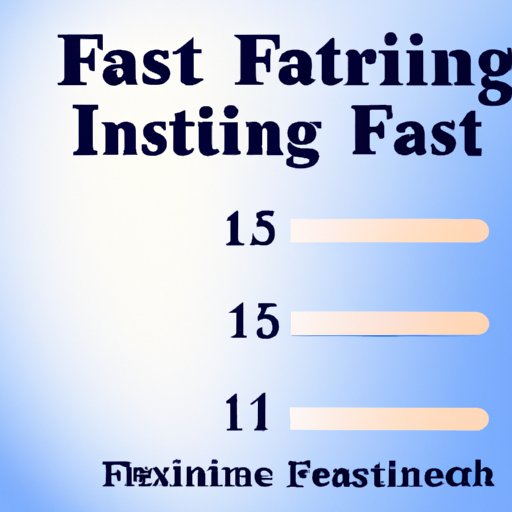
I. Introduction
Weight loss is a common goal for many individuals who wish to lead a healthy, fulfilling life. However, with countless weight loss methods available, it can be challenging to find one that works effectively. Fasting is one such method that has gained popularity in recent years. In this article, we will explore the science behind fasting and weight loss, different types of fasting, and how they affect weight loss, success stories, and comparisons with other weight loss methods.
II. The Science Behind Fasting and Weight Loss
Intermittent fasting (IF) is a method that involves abstaining from food for an extended period, typically 16-24 hours, followed by a shorter period of eating. When one consumes food, the body produces insulin, which is responsible for storing excess energy as fat. With IF, the body enters a state of low insulin and glucose, which prompts it to start breaking down stored fat for energy, leading to weight loss.
Studies have also shown that fasting can improve metabolism by increasing the levels of norepinephrine, a hormone responsible for burning fat. Furthermore, fasting can lower inflammation levels, reduce the risk of chronic diseases such as heart disease, and improve overall health.
III. Different Types of Fasting and Their Effects on Weight Loss
There are various types of fasting, including intermittent fasting, alternate-day fasting, and extended fasting. With alternate-day fasting, one goes a day without eating, followed by a day of regular eating. Extended fasting involves abstaining from food for more than 24 hours, typically up to 72 hours.
Certain types of fasting may be better suited to certain individuals and their goals. For example, individuals with high-stress jobs may find that alternate-day fasting works better for them, as it is less intensive than IF. Similarly, those with more significant weight loss goals may benefit more from extended fasts. However, the effectiveness of each method depends on factors such as age, body composition, and lifestyle.
IV. Success Stories of People Who Have Lost Weight through Fasting
Many individuals have shared their success stories of how fasting helped them lose weight effectively. For instance, in a study on the effects of IF, participants lost an average of 7.7 pounds in 12 weeks. On the other hand, alternate-day fasting can lead to an average weight loss of up to 20 pounds in ten weeks. Moreover, success stories on social media platforms such as Instagram are a great source of motivation for those who want to try fasting.
V. Comparing Fasting to Other Weight Loss Methods
While fasting has proven effective for many people, it is not suitable for everyone. For instance, those with health issues such as diabetes may need to consider other methods such as a low-carb diet. Calorie counting is also a popular weight loss method. Moreover, incorporating exercise into a daily routine can lead to weight loss and several other health benefits such as improving mood, reducing stress, and increasing overall fitness levels.
VI. Practical Tips for Implementing Fasting into Your Weight Loss Routine
For those considering fasting to achieve their weight loss goals, it is essential to ease into it gradually to avoid adverse reactions such as headaches, nausea, and fatigue. Drinking plenty of water, consuming adequate amounts of vitamins and minerals, and ensuring that food intake is healthy and balanced are necessary for optimal health. Additionally, meal planning and adhering to a regular sleep schedule are crucial for effective weight loss through fasting.
VII. Conclusion
Overall, fasting can be an effective weight loss method for many individuals. Understanding the science behind how fasting works, the different types available, and comparing it to other methods can help individuals make informed choices. There are risks and benefits to fasting, and it may not be effective for everyone. However, for those who find success with it, fasting can provide weight loss and several other health benefits.




